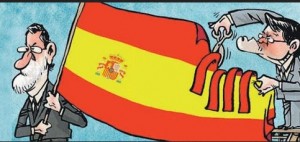Politicians in both Madrid and Barcelona are using history as a source of rancor. Spanish nationalists argue that Catalonia was always part of Spain. At the same time, Catalans trace their independent identity back to the 13th century and say they have a right to express their will. Spain’s 1978 constitution doesn’t allow any region to vote alone on independence: Either all of Spain votes on the Catalan question, or no one does. Spain’s Socialist Party, which draws considerable support from Catalonia in Parliament, is proposing a wide-ranging reform of the constitution to clear the way for a negotiated setlement. Many Catalans say it’s too late for that now.
Catalonia won back control of its health, education and language policies after Franco’s death in 1975, although it didn’t get the tax-raising power awarded to Spain’s Basque Country, where terror group ETA has killed more than 800 people during its own four-decade campaign for independence. Catalonia’s powers were extended with a 2006 law that included references to the region as a separate “nation” and guaranteed the region’s share of public investment. When large parts of that law were struck down in 2010, many Catalans decided their future lay outside of Spain and support for independence surged. Catalonia’s ballot would have come less than two months after Scotland voted to remain part of the U.K., though that referendum was sanctioned by the British government. The votes are emboldening from places like Flanders and Venice, where smaller nationalist groups aspire to dismantle European states forged in the 18th and 19th centuries.

